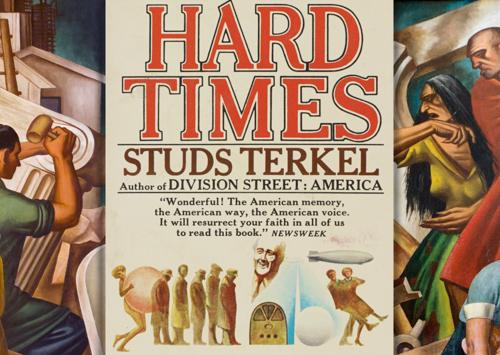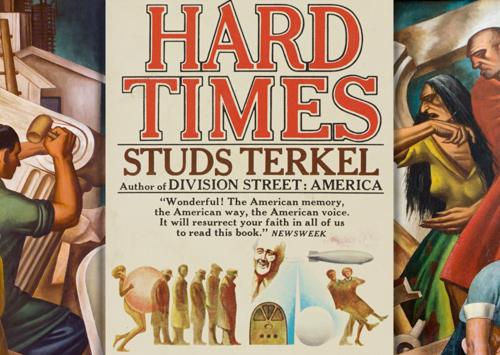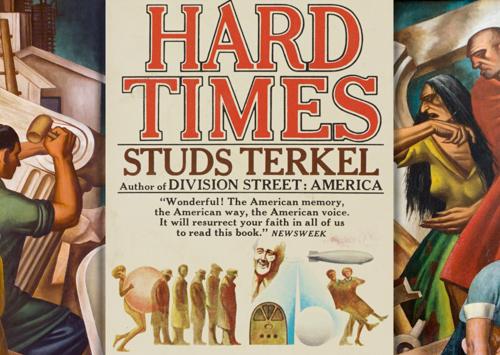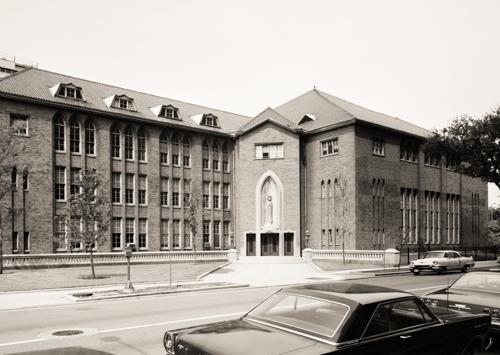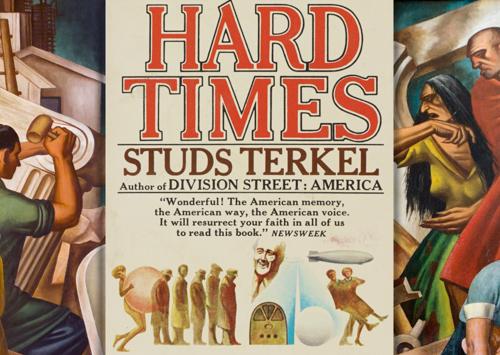Listen to New Voices on Studs Terkel our partnership with 826CHI-here! Read the Story
Showing 1 - 12 of 12 results
-
Win Stracke, Bill Adelman, and Bill Neebe discuss May Day and the Haymarket Square Riot
Apr. 29, 1976 Win Stracke, Bill Adelman, and Bill Neebe discusses the Haymarket Riot and the following trials and hangings which changed the labor movement around the world. The group discusses the American labor movement and police brutality that led to the protest and the eventual accusal of eight men. They also explore the roles George Pullman, Marshall Field, and the police force played and how they used the protest to weed out union leaders they did not like. The group briefly discusses the future of the labor movement.
-
Terkel comments and presents"Hard Times: an oral history of the great depression" ; part 3
May. 27, 1971 Presenting an award-winning summary program of "Hard Times: an oral history of the great depression" series 1971-72: "A gathering of survivors" (part two) with Jim Sheridan, Pauline Kael, Emma Tiller, Frank Czerwonka, Cesar Chavez, William Benton, Sidney Weinberg. Chapter 12.
-
Terkel comments and presents"Hard Times: an oral history of the great depression" ; part 2
May. 27, 1971 Presenting an award-winning summary program of "Hard Times: an oral history of the great depression" series 1971-72: "A gathering of survivors" (part two) with Jim Sheridan, Pauline Kael, Emma Tiller, Frank Czerwonka, Cesar Chavez, William Benton, Sidney Weinberg. Chapter 12.
-
Terkel comments and presents"Hard Times: an oral history of the great depression" ; part 1
May. 27, 1971 Presenting an award-winning summary program of "Hard Times: an oral history of the great depression" series 1971-72: "A gathering of survivors" (part two) with Jim Sheridan, Pauline Kael, Emma Tiller, Frank Czerwonka, Cesar Chavez, William Benton, Sidney Weinberg. Chapter 12.
-
Terkel comments and presents "Hard Times: an Oral History of the Great Depression" ; Chapter 7
1971 Presenting "Hard Times: an Oral History of the Great Depression" High Life, Sixteen Ton: Chapter 7. Sally Rand talks about the creation of her signature fan dance and predictions for future depressions. Doc Graham discusses his upbringing, Chicago mobs, and Count Victor Lustig. Tony Soma talks about prohibition before and after the 1929 crash. Jerome Zerbe talks about inventing paparazzi photography, spending two weeks working in a coal mine, and the New Deal. Buddy Blankenship recalls working 16 hour days in West Virginia coal mines. Mary Owsley remembers life as a coal miner's wife.
-
Terkel comments and presents "Hard Times: an Oral History of the Great Depression" ; Chapter 7
1971 Presenting "Hard Times: an Oral History of the Great Depression" High Life, Sixteen Ton: Chapter 7. Sally Rand talks about the creation of her signature fan dance and predictions for future depressions. Doc Graham discusses his upbringing, Chicago mobs, and Count Victor Lustig. Tony Soma talks about prohibition before and after the 1929 crash. Jerome Zerbe talks about inventing paparazzi photography, spending 2 weeks working in a coal mine, and the New Deal. Buddy Blankenship recalls working 16 hour days in West Virginia coal mines. Mary Owsley remembers life as a coal miner's wife.
-
King Solomon discusses his life and Barry Byrne discusses Frank Lloyd Wright
1968 Both interviews incomplete. King Solomon as Kid Pharaoh, hot dog shop owner in Chicago, and former prize fighter. Mr. Solomon talks about his business and how he has earned his place. He talks about being a gambler, and speaks of being "rough" and receiving his money in an unorthodox manner, "protection" so to speak. The Interview ends abruptly at 13:42. At 13:43 interview begins with Barry Byrne architect and student of the "Prairie Style" talks about his education with Frank Lloyd Wright. He speaks fondly of "father"(Frank Lloyd Wright) and his time studying under him.
-
John Kenneth Galbraith discusses his book, "The Age of Uncertainty"
Apr. 8, 1977 John Kenneth Galbraith, economist and diplomat, discusses his book, "The Age of Uncertainty," which was being made into a PBS documentary. Galbraith talks about some of the most well-known economists and explains their writings. He explains how many of their ideas have long lasting effects on capitalism the US has today.
-
Inteviewees discuss a variety of topics from the Hard Times: an Oral History of the Great Depression program; excerpts part 3
Excerpts from different episodes of "Hard Times: an Oral History of the Great Depression". Concerning The New Deal: Ed Paulsen talks about conflicting feelings regarding the New Deal and how the government seemed more present in daily life. Gardner C. Means explains how the New Deal was created to help save the country. Joe Marcus remembers feeling like his ideas were valued and were making a difference in his government job. John Beecher talks about working in the transient camps.
-
Discussing the triple revolution with Bayard Rustin, W. H. Ferry and Ralph Helstein ; part 1
Aug. 1, 1964 Discussion about the triple revolution



